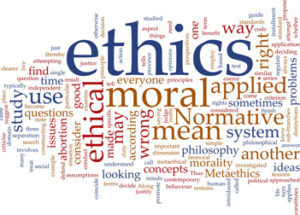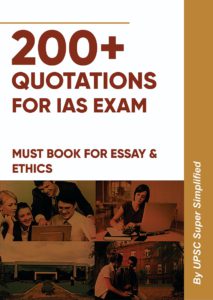
In Part A of Ethics, many questions are based on keywords in the syllabus. In these types of questions, you need a short definition and examples. Here, we have given short definitions. You have to remember this. You can add extra points on your behalf.
1 Ethics- Motivation based on ideas of right and wrong; being consistent with fundamental human virtues.
2 Integrity- Moral Soundness(intactness).
3 Aptitude- Natural ability to do something.
4 Attitude- A settled way of thinking for feeling about something ( Eg. Religion, Race, Cast, Sex).
5 Probity- Quality of having strong moral principles.
- Honesty, integrity, uprightness.
- Applying public sector value such as -TRANSPARENCY, ACCOUNTABILITY, IMPARTIALITY.
6 Human Values- Beliefs of a person or social group, in which they have an emotional investment.
7 Persuasion- Cause somebody to adopt a certain position or belief or course of action.
8 Impartiality- Quality of treating different views or opinions equally and fairly.
9 Non-Partisonship- Not supporting or influenced by any political party or special interest group.
10 Objectivity- Judgement based on observable phenomenon uninfluenced by emotions or personal prejudice.
11 Sympathy- Human quality of sharing sufferings of others.
12 Empathy- Human quality not only sharing but also understanding the suffering of others.
13 Compassion- Human quality of understanding others Sufferings and wanting to do something.
14 Tolerance- Willingness to recognise and respect the beliefs of others.
15 Emotional Intelligence- Ability to identify assess and manage one’s own emotions and other emotions.

16 Dilemma- State of uncertainty requiring a choice between equality unfavourable options.
17 Conscience- Conformity to one’s own ideas of right and wrong.
18 Corruption- Use of position of trust for dishonest gains.
| Monopoly+ Discretion – Accountability = Corruption |
19 Conflict of interests – A situation where a conflict arises between public duty and private interests.
20 Preserverance – Persistence in doing duty despite difficulty or delay in achieving success.
21 Commitment – Quality of being dedicated to cause or activity.
22 Courage of Conviction – To act in accordance with one’s beliefs, in spite of criticism.
23 Crisis of Conscience- A situation in which it is very difficult to decide what is the right thing to do.
24 Happiness – State of well being characterised by emotions ranging from contentment to intense joy.
25 Patriotism – Feeling of love and dedication towards the motherland.
26 Trust deficit – Inverse of trustworthiness.
27 Trustworthiness – A virtue of earning the faith of others in oneself regarding some purpose.
28 Fortitude – Mental and emotional strength in facing difficulty, adversity, danger or temptation courageously.
29 Public Service – Service provided by the government for its citizens either directly or indirectly.
30 Wisdom – Right application of knowledge.
31 Inequality – Gap in Environment, Affordability, resources available to one in relation in other.
32 Social Justice – Justice in terms of the distribution of wealth, opportunities and privileges within a society.
33 Accountability – To take responsibility for the outcome of one’s action and address the issues coming out of it promptly and fairly.
34 Integrity – Consistency of values, principles, expectations actions and outcomes in the context of the behaviour of an individual.
35 Probity –
- Being a person of honesty, integrity and uprightness.
- Applying values of impartiality, accountability and transparency.
- Being incorruptible.
- Respecting human, it’s compassion for downtrodden and commitment to their welfare.
36 Citizen’s Charter- An undertaking, public organization gives to citizens, to provide a high level of service, while meeting standards contained in declaration
37 Work Culture- A set practices, values, and shared beliefs within an organization and in its employees that arises from generally regarded as appropriate way to think and act.
